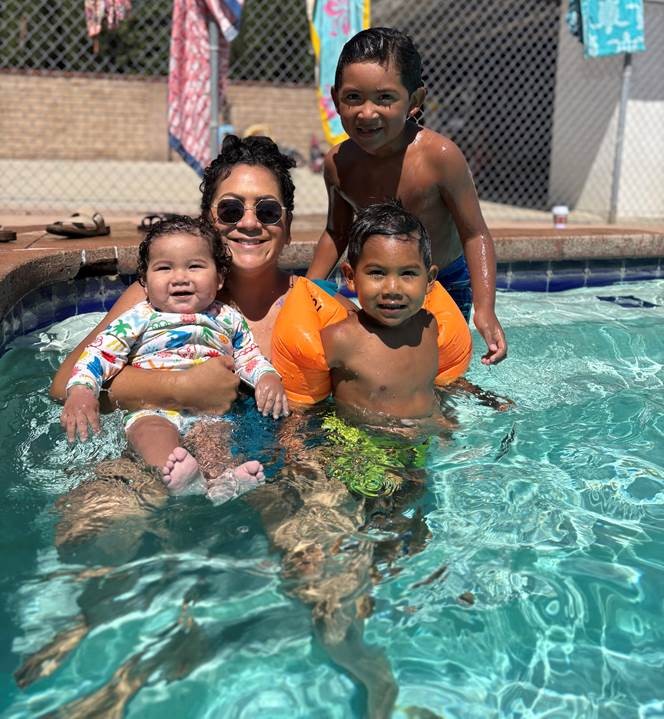


Motherhood is a multifaceted journey, encompassing joy, challenges, sleepless nights, embracing physical and mental changes, and a deep emotional connection with your child. It involves constant learning, flexibility, and finding a balance between personal and family life. Each mother’s experience is unique, shaped by individual circumstances and the evolving dynamics of parenthood. Whether this is your first or third child, postpartum can be difficult for every parent. It is important to have the right support and postpartum essentials that can help make the experience go a little smoother. Below are five tips to support you in your postpartum journey.
During postpartum, it is easy to be hard on yourself as you navigate the new routine while adjusting to the hormonal shifts and physical changes taking place in your body. Immediately after childbirth it might be difficult to engage in regular daily behaviors like showering and cooking meals while taking care of an infant. It is important to be kind to yourself and watch out for any negative self-talk in the weeks and months following the birth of your child. Remember that regardless of whether this is your first time being a parent or not, you are navigating a huge life change. The daily routine you had prior to the birth of the new member of your family will look significantly different than after. You might be unable to do things around the house or have downtime in the same way you did pre-baby. Be gentle and kind to yourself as you navigate through sleepless nights, loss of pregnancy weight, and the new routine of continuous diaper changes and feeds. It is also important to be kind to yourself, as it takes time for you to feel more like yourself.
Maintaining a growth mindset is an essential wellbeing strategy that helps new moms reduce stress, and respond positively not only to postpartum challenges, but also parenting as a whole. A growth mindset refers to having the belief system that your own abilities and skills can improve over time with continuous effort, learning, and internal resilience. Despite how prepared a new mom might feel initially from the preparation done during pregnancy, nothing can truly prepare a person one hundred percent for the time post childbirth. Every mom’s postpartum experience is unique, and every new baby has their own unique personality and temperament. Consequently, your experience might not mirror what you read, researched, or might have experienced following the birth of another child before. Similarly, knowing how to respond to your child’s sleeping and feeding cues might take time. Keeping a growth-oriented mindset will help remind yourself that it is okay to learn and improve your ability to understand your baby’s needs and wants over time. Embracing this philosophy is an essential way to stay emotionally well not only during the postpartum period, but also during the first year as you navigate through your child’s developmental milestones.
Taking care of a new baby can be demanding and require all of one’s attention and energy. Due to this, it can be normal for new moms to forget to check in with themselves on what they need to stay well both physically and emotionally. An important strategy to incorporate post-partum is to prioritize an internal check-in with yourself daily. This check-in can be simply asking yourself the following questions, “How are you feeling physically?”, “What are you experiencing in the present moment emotionally?”, “What do you need in this moment to feel more grounded and/ or supported?” These questions can be quite powerful to increase awareness of what you might need. Your daily check-in could also be done as a mindfulness practice incorporating five to ten minutes of meditation, deep breathing, and/ or others. With either approach, having a better awareness of what you need to be well is the first step in obtaining it.
Once you get the “all clear” from your physician, introduce gentle movement back into a daily routine. Go for walks with the baby outside and/ or walk around the house if that works better depending on the season and climate. Gentle movement not only helps physical wellbeing efforts but also boosts mental energy and mood as well. In addition to introducing gentle movement back into a routine, focus on drinking enough water to stay hydrated. This is especially important if you are nursing or are planning to nurse. Drinking enough water is essential for cognitive functioning and emotional regulation, especially while operating on minimal sleep. Furthermore, focus on eating whole foods and meals that sustain energy throughout the day.
Give yourself permission to allow support from loved ones in your life. Say yes when friends and family offer to cook, clean, or take care of the baby to assist in those early weeks.
This can allow you to heal and incorporate emotional and physical self-care into your day. If you are used to doing everything on your own without help, then this strategy can be difficult to do initially. However, it is extremely helpful to allow yourself to do so. Do not be afraid to ask for help from friends and family if needed. Remember, asking for help is not a sign of weakness, but of strength. A self-aware person knows when they need support and are not hard on themselves when asking for it. If you experience baby blues in the early weeks or months after the birth of your child, know that this can be a normal part of the journey. Seventy to eighty percent of women may experience symptoms like unexplained crying, irritability, mood fluctuations, and sadness. If you find that you need additional support based on how you are feeling, remember that your OB-GYN is there to support you. Contact your OB-GYN or primary care physician if you feel that your mood is not improving and depressive symptoms are lasting daily for two weeks. Regardless of whether you experience baby blues or postpartum depression, know that you are not alone. Seek support as needed.
Every mother’s journey postpartum is different, but incorporating these strategies can help keep emotional wellness top of mind during the postpartum period. In addition to prioritizing these efforts during the postpartum period, it is important to continue these self-care efforts throughout the first year as your child grows and develops.
For me, being kind to yourself is most important and has helped me in my postpartum journey. What a wild ride it has been! I must constantly remind myself that I created life and that this crazy, beautiful thing called motherhood is an ever-evolving journey.
So, BE KIND!
-Catrina Rodriguez, Penny Lane Centers

Adventure has a way of catapulting us out of our comfort zones and embracing experiences we had not imagined. These moments can feel unsettling at first, yet it is often within these unplanned detours that the seeds of growth and renewal begin to take root. For me, one of these adventures started when I agreed to accompany my husband and adult sons on a backpacking trip. Everything I needed was packed on my back and as we started out, I eagerly anticipated getting to our planned destination at 11,050 feet in Bishop. What I had not accounted for were the obstacles that would test me along the way. After several hours of hiking uphill, we encountered so much snow on our path, the trail disappeared, and we had no way of knowing where we even were. To make matters worse, I had only worn tennis shoes, which were cold, slippery and wet.
Many times, along this journey, I asked to go back, thought I would never make it, and wondered why I had even agreed to this in the first place. By the time we got to our destination and found a clearing to pitch our tents, it was dark. We tried lighting a fire, but the dampness didn't help at all. We were alone completely isolated as no one else dared to take the trek that got us to this point. The morning finally came after a very long and sleepless night. As I stepped out with the vast lake and mountain beside us, still half covered in snow, I stood breathless. The world unfolded before me in a way I hadn't known it could. There was a silence and a peace that commanded a sense of awe and reverence that settles deep in your soul.
My entire perspective changed in an instant. The challenges I experienced just the day before reminded me of how much I was able to overcome. There were strengths within me that I was able to uncover that I would have never know existed. It was in those unscripted moments that life reveals its richest colors.
Adventures are about growth, discovery, transformation and the stories we collect along the way. You don't have to go backpacking to discover this for yourself. Whether it's just trying something new like one of our Penny Lane challenges, or trying something in a different way, it's about embracing change instead of resisting it. In doing so, we open ourselves to journeys and perspective that can redefine not only our paths but our sense of self.
Ultimately, finding your next adventure is about choosing to live deliberately. It's about saying yes to change, even when it's daunting, and trusting that the journey will be worth it. So, whether you're itching for a big leap or a small shift, listen to that inner voice calling you forward. Your next adventure might be closer than you think—and it could be the very thing that helps you rediscover your spark.
Check out some more photos of her adventure below!





